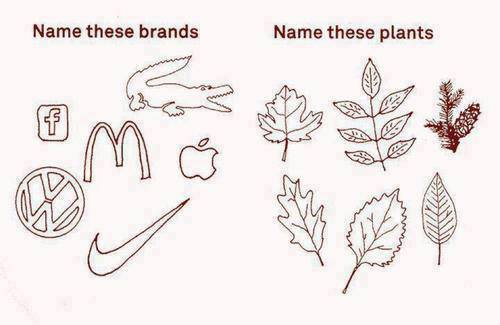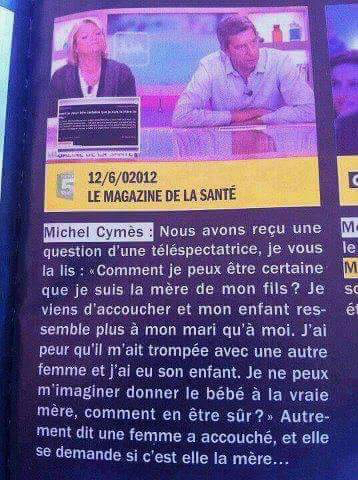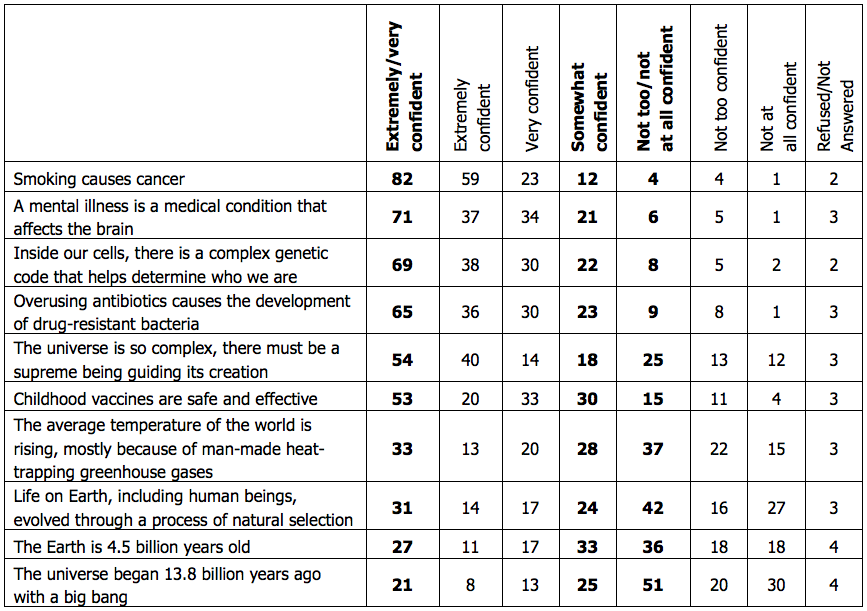

Source : X

Source : X
Un sondage a été réalisé du 20 au 24 mars 2014 auprès de 1012 Américains âgés de plus de 18 ans pour tester leurs connaissances à propos du cancer, des vaccins et d'autres domaines scientifiques.

Source : http://surveys.ap.org (pdf)
 […] Those results depress and upset some of America's top scientists, including several Nobel Prize winners, who vouched for the science in the statements tested, calling them settled scientific facts.
[…] Those results depress and upset some of America's top scientists, including several Nobel Prize winners, who vouched for the science in the statements tested, calling them settled scientific facts.
"Science ignorance is pervasive in our society, and these attitudes are reinforced when some of our leaders are openly antagonistic to established facts," said 2013 Nobel Prize in medicine winner Randy Schekman of the University of California, Berkeley.
The poll highlights "the iron triangle of science, religion and politics," said Anthony Leiserowitz, director of the Yale Project on Climate Change Communication.
And scientists know they've got the shakiest leg in the triangle.
To the public "most often values and beliefs trump science" when they conflict, said Alan Leshner, chief executive of the world's largest scientific society, the American Association for the Advancement of Science.
Confidence in evolution, the Big Bang, the age of the Earth and climate change decline sharply as faith in a supreme being rises, according to the poll. Likewise, those who regularly attend religious services or are evangelical Christians express much greater doubts about scientific concepts they may see as contradictory to their faith.
"When you are putting up facts against faith, facts can't argue against faith," said 2012 Nobel Prize winning biochemistry professor Robert Lefkowitz of Duke University. "It makes sense now that science would have made no headway because faith is untestable."
But evolution, the age of the Earth and the Big Bang are all compatible with God, except to Bible literalists, said Francisco Ayala, a former priest and professor of biology, philosophy and logic at the University of California, Irvine. And Darrel Falk, a biology professor at Point Loma Nazarene University and an evangelical Christian, agreed, adding: "The story of the cosmos and the Big Bang of creation is not inconsistent with the message of Genesis 1, and there is much profound biblical scholarship to demonstrate this."
Beyond religious belief, views on science may be tied to what we see with our own eyes. The closer an issue is to our bodies and the less complicated, the easier it is for people to believe, said John Staudenmaier, a Jesuit priest and historian of technology at the University of Detroit Mercy.
Marsha Brooks, a 59-year-old nanny who lives in Washington, D.C., said she's certain smoking causes cancer because she saw her mother, aunts and uncles, all smokers, die of cancer. But when it comes to the universe beginning with a Big Bang or the Earth being about 4.5 billion years old, she has doubts. She explained: "It could be a lack of knowledge. It seems so far" away.
Jorge Delarosa, a 39-year-old architect from Bridgewater, N.J., pointed to a warm 2012 without a winter and said, "I feel the change. There must be a reason." But when it came to Earth's beginnings 4.5 billion years ago, he has doubts simply because "I wasn't there."
Experience and faith aren't the only things affecting people's views on science. Duke University's Lefkowitz sees "the force of concerted campaigns to discredit scientific fact" as a more striking factor, citing significant interest groups — political, business and religious — campaigning against scientific truths on vaccines, climate change and evolution.
Yale's Leiserowitz agreed but noted sometimes science wins out even against well-financed and loud opposition, as with smoking.
[…]
Source : http://ap-gfkpoll.com/featured/findings-from-our-latest-poll-2 (mars 2014)